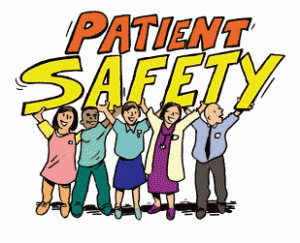The Professional Patient Safety Tips
 National Patient Safety Awareness Week was observed the beginning of this month. So, in the spirit of that week, here are 10 tips for keeping yourself safe with living with health conditions and being in and out of clinics and the medical systems.
National Patient Safety Awareness Week was observed the beginning of this month. So, in the spirit of that week, here are 10 tips for keeping yourself safe with living with health conditions and being in and out of clinics and the medical systems.
1. Keep an up to date list of medications. Bring that list to appointments, especially appointments with new providers. Keep it on you in case of emergency. Many cell phone application stores have low cost or free apps where you can enter medication lists and other emergency information. Go through your med list at each appointment to check to make sure it’s accurate.
2. Ask questions. Ask about why labs and tests are being ordered, about your medications and side effects. If you’re hospitalized, ask what medications you are getting, ask about the procedures they’re doing. It’s your right to know. If you’re not sure about something, ask.
3. If you have cognitive issues, are acutely ill or are undergoing procedures that could cause some grogginess or loopiness, have trusted friends or relatives accompany you. You’ll have someone who can help you remember discharge instructions, help you remember questions you want to ask and help you remember what went on while you weren’t exactly with it.
4. Prevent infection. Obviously, we can all do our part with washing our hands, but don’t hesitate to ask medical staff to wash theirs or to change gloves during procedures.
5. Educate yourself. Learn what you can about your condition and your medications. Pharmacists are awesome if you have medication questions.
6. Educate others. Educating your friends and family on your illness helps them better advocate for if you need them too. They are also able to know what to do if there’s an emergency and what to tell emergency personnel.
7. Try to keep the same providers and pharmacies or stay within the same system. Many clinics and hospitals have health records online and are able to access your information from one clinic site to another. The same is true for pharmacy chains. It’s also best to go to one pharmacy as then all your medications are in the same place and they are able to better monitor for interactions.
8. If you have multiple providers, sign releases so that they can work together. Make sure they are aware of what the others are doing.
9. Know when to expect your lab results. If you don’t hear back on them, call and ask for them. Ask for paper copies of your labs. Some hospitals offer services where you can access your lab results online after they have been sent to the provider who ordered them.
10. Know your patient rights and responsibilities. Those can be found here. http://patients.about.com/od/empowermentbasics/a/patrr.htm
Article written by Staff Writer, Agnes Reis
Agnes is a nursing student in Minnesota. She was diagnosed with CFIDs in 1999 followed by fibromyalgia the following year, along with lifelong allergies, asthma and migraines. She can be found at brigid22.wordpress.com or @brigid22 on twitter, but cautions twitter followers that there’s a heavy dose of sports and nursing along with the spoons.
-
Noren Das
-
Caroline
-
travel pharmacist
-
Sacredjinx(Sonja McDaniel)
-
Sandy
-
Karen Brauer
-
Storm
-
Sonya


